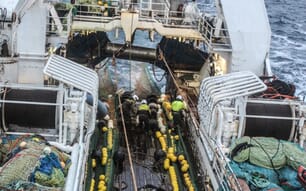The fishery will be assessed by independent certifier Food Certification International Ltd (FCI). If successful, over 114,000 tonnes of Atlantic cod and over 50,000 tonnes of Atlantic haddock will be eligible to bear the MSC ecolabel.
The fishery comprises 31 vessels ranging from 34 meters to 94 meters, fishing year round using demersal trawl; and a further three vessels of 54 meters, using longline gear to catch cod and haddock. The fisheries take place inside the Barents and Norwegian seas at ICES Areas Ia,Ib, IIa and IIb; within coastal waters inside the Norwegian and Russian Exclusive Economic Zones and international waters.
The main markets for the fishery’s products are Russia, the US, Europe and China.
Olga Pokrovskaya, the UFN coordinator for the certification process says: “We are happy that after a long preparation for the assessment, we are now entering the very important public Full Assessment phase. The full assessment against MSC standards is a robust test for the sustainability of our fisheries, and the Union is prepared looks forward with confidence to go through the process”.
Camiel Derichs, MSC’s deputy director Europe says: “The Barents Sea cod and haddock fisheries are certified in Norway, and through Ocean Trawlers a portion of these fisheries in Russia have also been certified. It is great that now the rest of the Russian Barents Sea fleet is entering the MSC programme to be assessed against MSC standards. We hope that the assessment will be successful, many markets are eagerly awaiting MSC certified cod and haddock from Russia.”
Cod & Haddock to Enter MSC Assessment
NORWAY and RUSSIA - The Union of Fishermen of the North (UFN) has entered the Barents and Norwegian Seas cod and haddock fishery for full assessment for Marine Stewardship Council (MSC) certification.
by Lucy Towers




